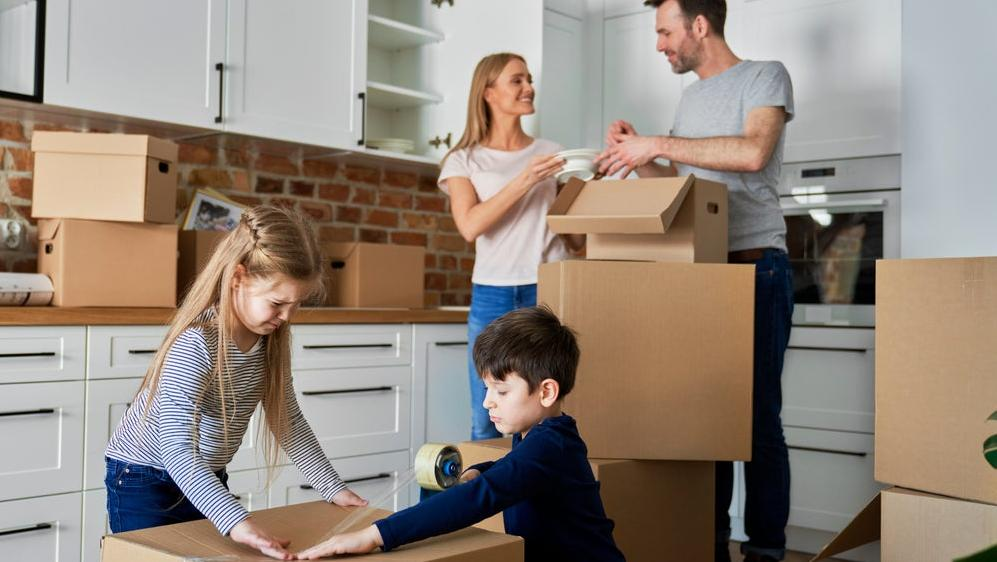You Should Know How To Pack A Kitchen
I thought I was well-organized, but I did a face plant when it came to my cupboards.
I recently moved from my mother's spacious condo in Ann Arbor, which my brother and I inherited when she died, to a two-bedroom place in New Orleans. Before leaving, I put in an enormous amount of preparation—at least, it seemed that way. I cleared out a storage unit, had an estate sale of my mother's and my things, wrote endless Post-It notes with instructions for the movers, and spent an entire weekend focused solely on setting up my new kitchen.
I thought I could simply unpack and launch my new life. As Southerners say, bless your heart. My clothes, furniture, and books all fit into my new place, which has high ceilings and a beautiful balcony in the heart of the Garden District. But I completely miscalculated the shift required to set up a much smaller kitchen.
I should have been ready. Tiny kitchens are something I've experienced in other vintage city apartments, too, from Chicago to Boston. In New York City, my closet kitchen was hidden behind a door decorated to look like a bookcase.
For New Orleans, I could have done a lot more to ease the transition. Based on my experience, here are tips for making sure your kitchen can survive a move.

Be realistic about the space you’ll have
Take lots of photos of the kitchen before you move in, or get them from your landlord. Count the cupboards and especially the drawers. (I looked at an otherwise charming Boston apartment that did not have a single kitchen drawer. Where did tenants keep scissors?)
If possible, get measurements. You need to be sure that your baker's rack will fit or that the toaster will have a countertop spot.
Eliminate items BEFORE you move
This is my biggest regret. Don't take doubles or multiples of any kitchen tools unless you can justify the extras. Sort in advance. I somehow brought five colanders to my new place—two of them exactly the same design—when one would have worked.
I had 12 IKEA drinking glasses, eight identical Liberty of London coffee mugs from the Target collection, and don't even remind me about my public radio ones. All those things could have been sold or donated in advance, not discovered after.
Label the most important boxes
In one move, my knives seemed to be lost forever. I found them in the second to last box I unpacked, along with my TiVo, which had been nowhere near them at my previous home.
In this move, I wisely assembled a tool kit that I would need at the other end. However, I forgot to note which box it was in. I found it with office supplies (my mistake for leaving it on my desk). It's a good idea to have a box called "UNPACK ME FIRST." Take it with you instead of having the movers handle it.
When it is precious to you, be vigilant
I don't like to get in movers' way, but I persistently reminded them that my mother's green and white vintage china was irreplaceable, and I sat for a while in the kitchen, watching it get packed. If your mixing bowls are meaningful, don't just trust that the packers will understand that. Let them know. It may be important to you, but it's just something to pack for them.
Keep yourself organized
Even if you're using movers who pack up your items for you, it's your job to stay organized, not theirs. In the course of living in a place, your eating items wind up in rooms away from your kitchen, like your office or bedroom. Do a walk through, pick them up, and put them back in the kitchen. Otherwise, they'll get packed where they're found and it can take you weeks to figure it out.
Likewise, put gadgets and serving pieces in a single spot, not scattered in crocks or drawers. You might move things around in your new place, but at least you'll know what you own.
Ruthlessly eliminate ingredients
Give up on half-filled boxes of couscous and jars of spices you don't use. Toss out aging bread crumbs, salt cylinders with only a little remaining, and cake mixes you have been carrying around for years. If you didn't consider it important at home, you won't value it any more after you've relocated. Plus, these not-full containers can create a mess if they spill. To that end...
Protect anything that might leak (and be ready for it to happen anyway)
As soon as I started unpacking, I was showered by sea salt. One container got crushed in the move. Put tape around the necks of liquids like corn syrup and balsamic vinegar, and place them in Ziploc bags. The same goes for alcohol, whether the movers handle it or you do. Then, when you're unpacking ingredients at your new place, lay out some packing paper or have a tray handy to place things on.
Comfort yourself with something familiar
As soon as I got to New Orleans, I set up my green corner baker's rack with the copper teapots, saucepans, and pitchers that I keep on the shelves. Even though the rest of the room was a shambles, I could look at the rack and think, "I'm home."
